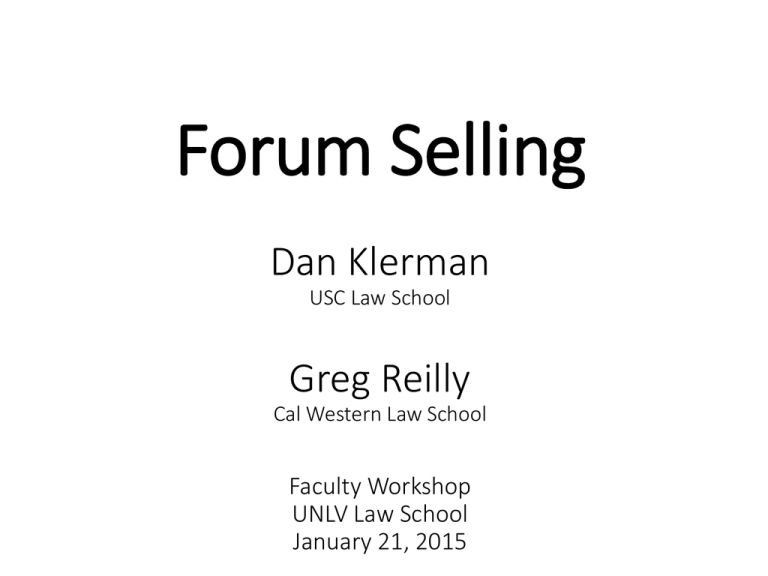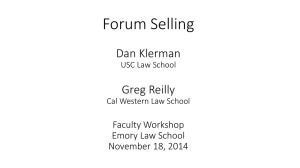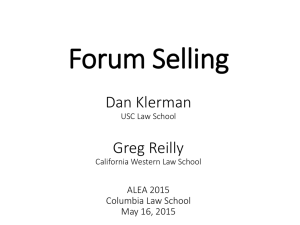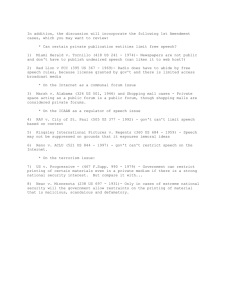Forum Selling - USC Gould School of Law
advertisement

Forum Selling Dan Klerman USC Law School Greg Reilly Cal Western Law School Faculty Workshop UNLV Law School January 21, 2015 Overview • Broad jurisdictional choice for plaintiffs leads to forum shopping • Forum shopping sometimes leads to some judges to try to attract more cases • Judges trying to attract more cases = “forum selling” • Since plaintiffs choose the forum, judges attract cases by making the law pro-plaintiff • Pro-plaintiff courts get a disproportionate share of litigation • So even if only a small number of judges are interested in hearing more cases • They can have a big impact on the law • That impact is usually bad • 5 case studies • • • • • Patents and the Eastern District of Delaware Class actions and “magic jurisdictions” Bankruptcy and the District of Delaware ICANN domain name dispute resolution Common law adjudication in pre-modern England • Constitutional constraints on personal jurisdiction can be justified, in part, as attempts to prevent forum selling • Forum selling can be prevented by tightening rules relating to jurisdiction and venue Patents and the Eastern District of Texas • The Eastern District of Texas is a small, mostly rural district • No major cities or tech companies • Yet, since 2007, it has had more patent infringement case filings than any other district • More than 3 times as many as the Northern District of California, which includes Silicon Valley • Almost one quarter of all patent cases filed in 2012-13 • EDTX is especially favored by Patent Assertion Entities • a.k.a. “patent trolls” • Patent venue statute interpreted to allow patentee to sue any place infringing product is sold • So defendant who makes nationally distributed product can be sued in any district • Much broader jurisdictional choice than in most other types of case • Contrast product liability, where Supreme Court has made it difficult to sue manufacturer where product is sold. McIntyre (2012) How Does the Eastern District of Texas Attract Cases? • Hostility to summary judgment • Less than 1% of cases resolved by SJ • Compared to almost 3.5% in other districts • Local rules require parties to ask judge’s permission before making motion for SJ • Broad interpretation of joinder rules • Before AIA (2012), patentee could join all defendants allegedly infringement same patent • Post AIA, patentee must sue them separately, but judges will consolidate them for pre-trial • Judge shopping • Plaintiffs can sue in division of their choice • Each division has few judges • Special patent case assignment rules assign patent cases to particular judges • • • • Broad initial disclosures Hostility to stays pending reexamination Hostility to transfers of venue Trial management Why Procedure? • Review by Federal Circuit makes substantive distinctiveness difficult • Rules of appellate procedure make procedural decisions almost unreviewable • • • • Final judgment rule Abuse of discretion standard of review Harmless error doctrine If case has gone to trial, courts decide appeal based on trial record • Not based on evidence presented on summary judgment motion • Only real remedy is mandamus • Mandamus is extraordinary remedy issued only in rare circumstances • Mandamus has never been issued by any federal court to review denial of summary judgment • Notable that Federal Circuit granted 10 mandamus petitions relating to refusal to transfer venue Why Does the EDTX Want to Hear More Cases? • Judges want interesting case load • Non-random assignment means that only those judges who want to hear patent cases get them • Prestige • Benefits to local bar • Benefits to local economy • Benefits to relatives • Post-retirement opportunities Why Is it Bad? • Patent law is generally seen as too broad • Broad scope impedes innovation • Especially in computer-related areas • Patent trolls are seen as particularly problematic • EDTX pro-plaintiff / pro-patentee bias makes matters worse • Patent law is highly technical • EDTX hostility to SJ means that, if case goes to trial, case resolved by largely uneducated jurors • EDTX is not just better, more expert forum • Alleged infringers almost almost never seek declaratory judgment in the EDTX • Hostility to SJ makes EDTX less predictable Other Examples of Forum Selling I • Class actions and mass torts in “magic jurisdictions” • Lax interpretation of jurisdictional rules allows class action plaintiffs to sue where named representative (but not other class members) were injured • Beneficial to plaintiffs or to plaintiff’s lawyers? • Partially cured by Class Action Fairness Act of 2005 • Bankruptcy and District of Delaware • Venue rules de facto allow big company to file for bankruptcy in any district • Since mid- 1990s, Delaware has heard most big case bankruptcies • Judges attract cases by giving lawyers large fees and approving reorganization plans • Deal with larger caseload by inviting “visiting judges” • But then take cases away if those judges do not follow Delaware practices • Controversy over efficiency implications Other Examples of Forum Selling II • ICANN domain name dispute resolution • Trademark owner gets to unilaterally select arbitration provider • Arbitration providers favor arbitrators who rule for trademark owners • Arbitration provider with lowest rate of pro-owner decisions went out of business • Common law judging in pre-modern England • Litigants could choose to sue in any of 3 common law courts • Judges paid, in part, by fees paid by litigants • Courts, especially King’s Bench, competed by making law more pro-plaintiff • Enforceability of oral promises (indebitatus assumpsit) • Lack of defenses in contract cases • Cheaper procedures to vindicate property rights (ejectment) • Checked by Parliament and Chancery/Equity • Statute of Frauds • Mistake, rule against penalties, unconscionability Contracts and Corporate Chartering • Paper focuses on non-contractual litigation • Forum selling may be beneficial in contracts • Sophisticated parties can select forum that maximizes value of their transaction • New York may be forum selling in commercial cases (Miller & Eisenberg 2009) • Need for mutual assent in contractual litigation gives courts an incentive to be fair and efficient • No corresponding incentive in patent, TM, tort, or other noncontractual litigation • Bankruptcy has contractual aspect, which may explain why there is a plausible argument that forum selling has been beneficial • Competition may be beneficial in corporate chartering • Because managers (may?) have incentives to maximize firm value • And thus choose to incorporate where law and adjudication are most efficient (Delaware?) • Contrast patent, TM and tort plaintiffs who, at time dispute arises, have no incentive to choose efficient forum Forum Selling and Personal Jurisdiction • Forum selling is made possible by broad interpretations of personal jurisdiction and venue rules • Can be prevented by tightening those rules • Or by interpreting them differently • Forum selling is relatively rare, because jurisdictional rules generally restrict where plaintiff can sue • Danger of forum selling provides explanation for why personal jurisdiction is constitutional issue • Danger of forum selling helps justify fact that statutes and constitution generally restrict plaintiff jurisdictional choice Why Not More Forum Selling? • Jurisdiction and venue rules are broad in some other areas • Antitrust • ERISA • Defamation • Possible answers • • • • Happening, but no one has noticed Not enough at stake MDL Just hasn’t happened yet Conclusion • Jurisdictional choice is bad, because it can lead to forum selling • EDTX is best documented case • Also mass torts, bankruptcy, ICANN domain name disputes, common-law judging in pre-modern England • Even though most judges do not want to hear more cases • And even though most judges wouldn’t distort law in pro-plaintiff way • It only takes a few motivated judges to have a large, negative effect • Consideration of forum selling • Helps explain constraints on jurisdiction and venue • Suggest how those constraints should be interpreted






